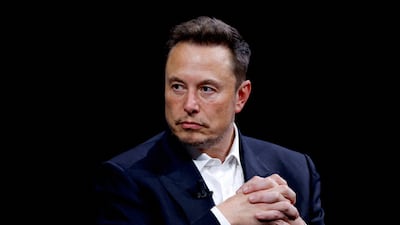Elon Musk, the chief executive of electric car maker Tesla, on Monday said he was uncomfortable growing the company to be a leader in artificial intelligence and robotics without having about 25 per cent voting control.
That level of control would be “enough to be influential, but not so much that I can’t be overturned”, Mr Musk said in a post o social media platform X.
“Unless that is the case, I would prefer to build products outside of Tesla.”
Tesla, the world’s largest car company in terms of market capitalisation, started production of the Dojo supercomputer last year to train AI models for self-driving cars.
Last year, Mr Musk launched an AI start-up called xAI, which has developed Grok, a chatbot rivalling OpenAI's ChatGPT.
Mr Musk, who is leading the new company that is a separate entity from his X Corp, waded into the AI field in 2015 when he cofounded OpenAI.
In a separate post, he said he would be fine with a dual-class share structure to achieve 25 per cent voting control but was told it was “impossible” after Tesla's initial public offering.
A company or stock with a dual-class equity structure features multiple classes of shares that come with varying voting rights.
Normally, insiders receive shares from a class that grants them increased control and voting privileges, while the general public is offered a class of shares carrying minimal or no voting rights.
“If I have 25 per cent, it means I am influential, but can be overridden if twice as many shareholders vote against me vs for me,” Mr Musk said.
“At 15 per cent or lower, the for/against ratio to override me makes a takeover by dubious interests too easy.”
Mr Musk, the world's richest person, owns about 13 per cent of Tesla stock after selling billions of dollars of the company’s shares in 2022 to help finance his $44 billion acquisition of Twitter.
Tesla recently lost its crown as the world’s largest EV seller to China's BYD, despite reporting record quarterly sales in the fourth quarter of 2023.
The Texas-based company sold 484,507 vehicles in the October-December period, an annual increase of about 20 per cent. Despite better-than-expected deliveries, it was fewer than the 526,409 EVs sold by BYD in the same period.
Electric vehicles will make up about half of the new car sales worldwide by 2035 as the push for net-zero carbon emissions accelerates, according to Goldman Sachs Research.

